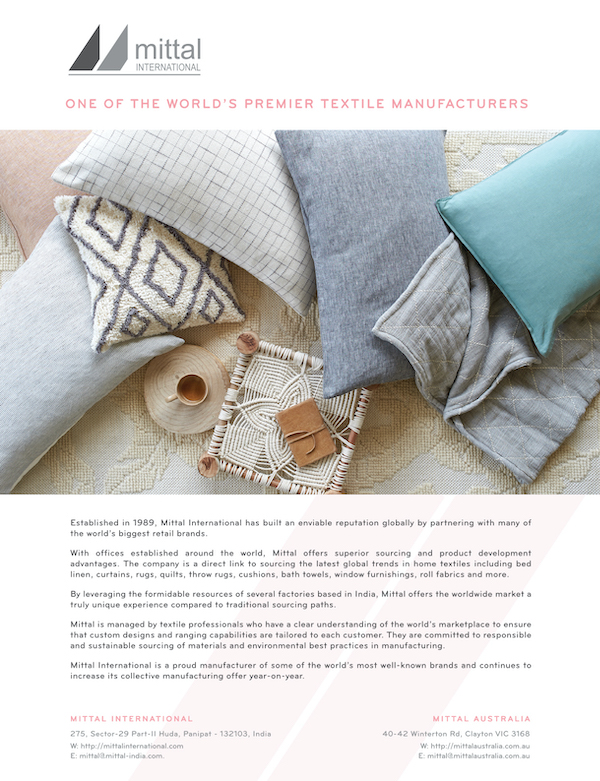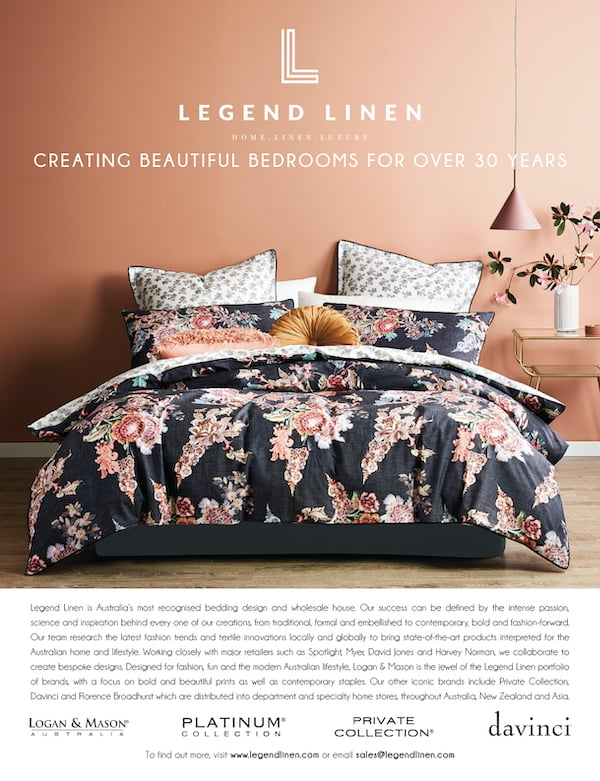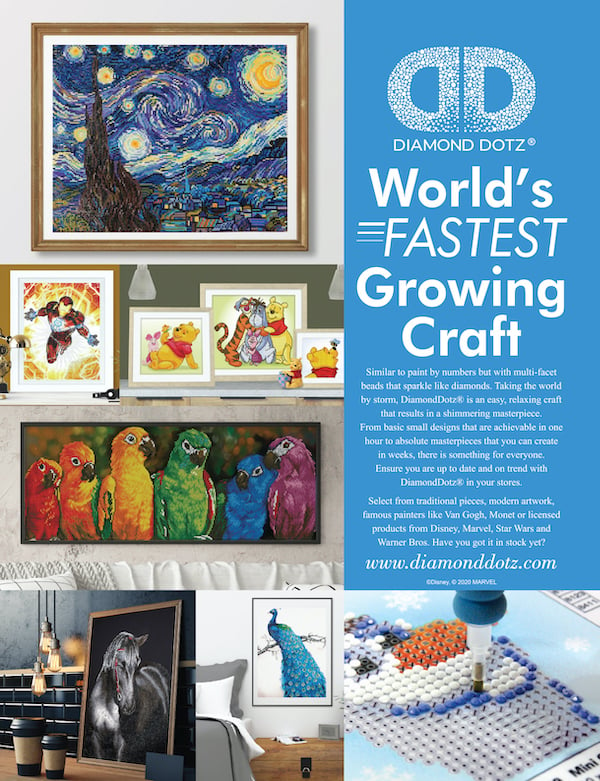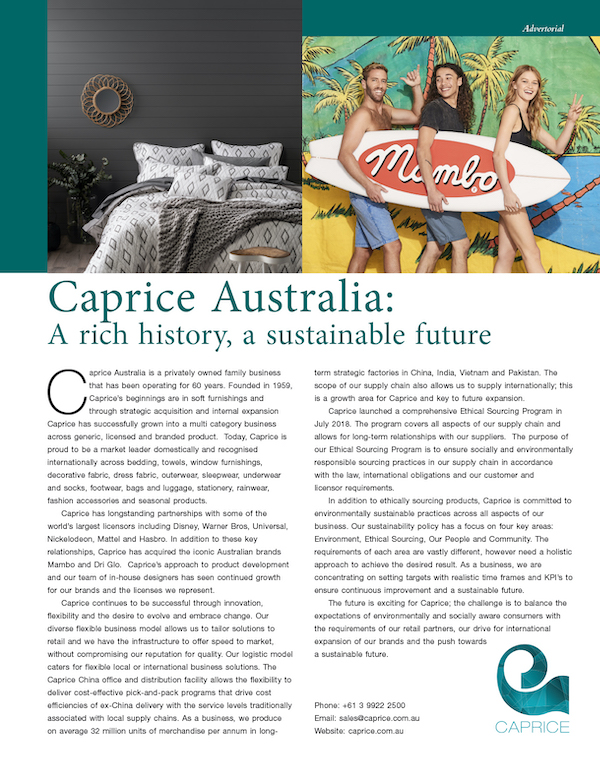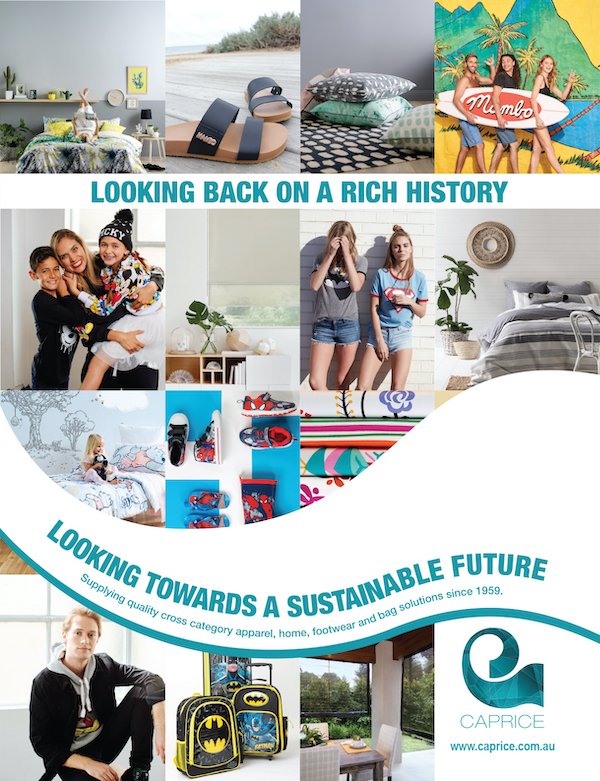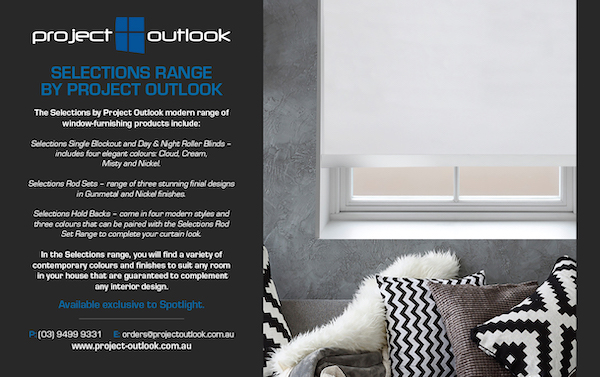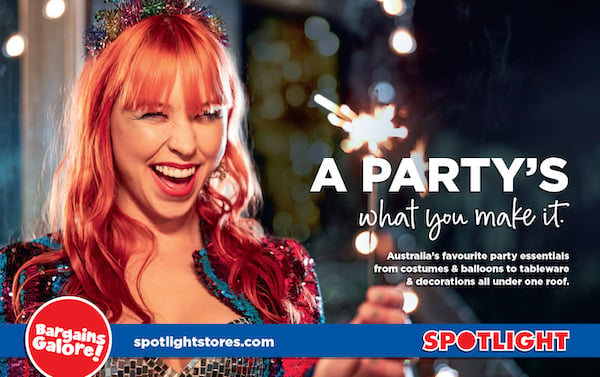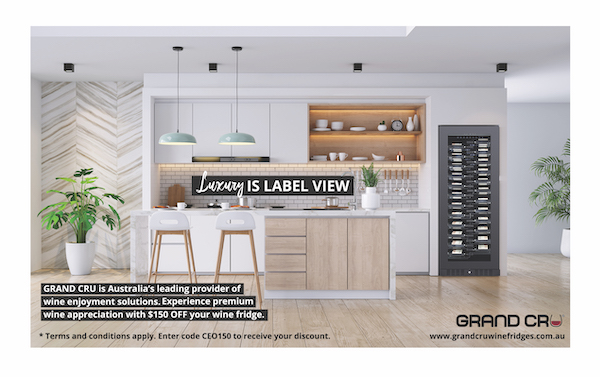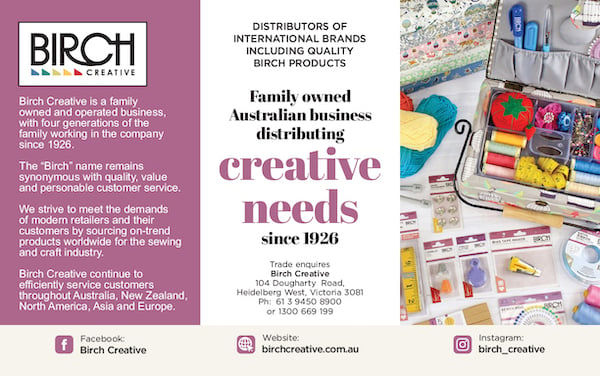Quentin Gracanin has that glorious gift of the gab that makes you feel included in everything he says, that your every word is listened to. The Spotlight CEO doesn’t talk about achievements or secrets to success; instead, he draws you in with wonderful storytelling and hilarious anecdotes.
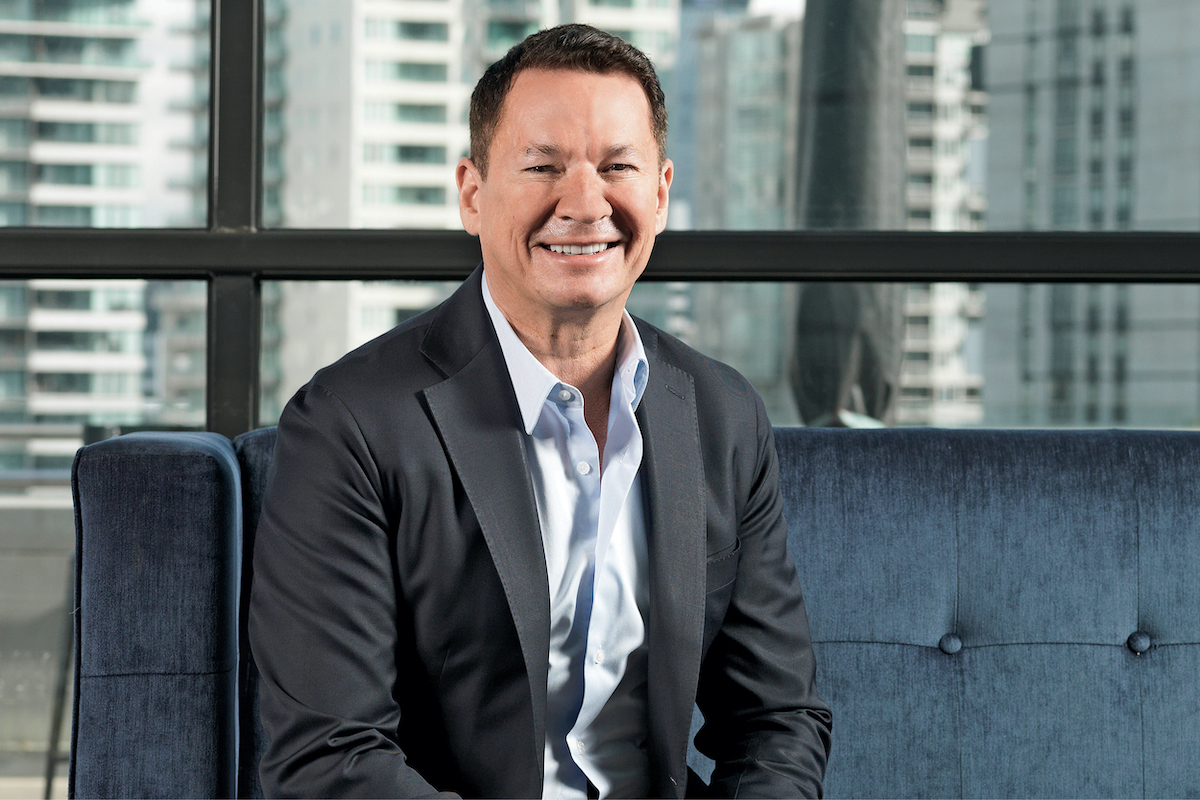
Like the time a lobster determined his career path and his tie played its own important role – separate incidents involving Spotlight Co-Founders and brothers Morry Fraid and Ruben Fried (and yes, their names are spelled differently).
Quentin, known throughout the company as Q, first joined Spotlight more than 28 years ago to work in the manchester division, a department he still cherishes and one we’ll explore later when discussing bed linen.
Based in Melbourne, Spotlight is Australia’s largest privately owned retail family business. Quentin heads a global team of 6,500 in stores taking up more than 550,000 square metres of retail space with 109 locations throughout Australia, 20 in New Zealand and two in Singapore and Malaysia.
It’s a great Australian success story for a family of immigrants from Israel who started learning about fabric and opened a stall at Melbourne’s Queen Victoria Market in the early 1970s.
The brothers offered ‘bargains galore’ when they opened their first Spotlight store in Malvern in September 1973 with a second store opening three years later in Box Hill. Singapore opened its first store in 1995, then New Zealand a year later and Malaysia in 2014. The company also launched outdoor adventure chain Anaconda in 2004 and acquired Mountain Designs in 2018.
An ultimate success story in retail, Spotlight’s bricks-and-mortar stores thrive alongside the company’s online business – probably because it’s such a touchy-feely store. You can’t help but wander the aisles in awe of the tremendous varieties of fabric, craft and homewares to make anything from a formal dress to cushions, kit out any room in the home or throw a fabulous party.
In fact, walk into Spotlight for some helium balloons and you’re likely to walk out with a trolley full of other stuff you never knew you needed. “That’s part of our formula,” Quentin laughs.
“Obviously, we have a loyal customer base – shoppers who’ve been coming to us for years – but when customers enter Spotlight for the first time they are so surprised by our range. They go in for needle and thread and walk out with a basket full of home products. It’s one of our unique value propositions, and obviously responsible for a lot of who Spotlight is today.”
“It’s one of our unique value propositions, and obviously responsible for a lot of who Spotlight is today.”
In March 2020, Spotlight officially unveiled its new brand marketing strategy with a compelling above-the-line campaign. The new brand marketing strategy, ‘It’s What You Make It’, will encourage more creating, decorating and celebrating than ever before as the business continues to excite and enable people to express themselves.
Quentin’s journey into retail began in Adelaide after leaving school and accepting a cadetship with Kmart, working four days on the shop floor rotating throughout departments and completing a day of theory on the fifth.
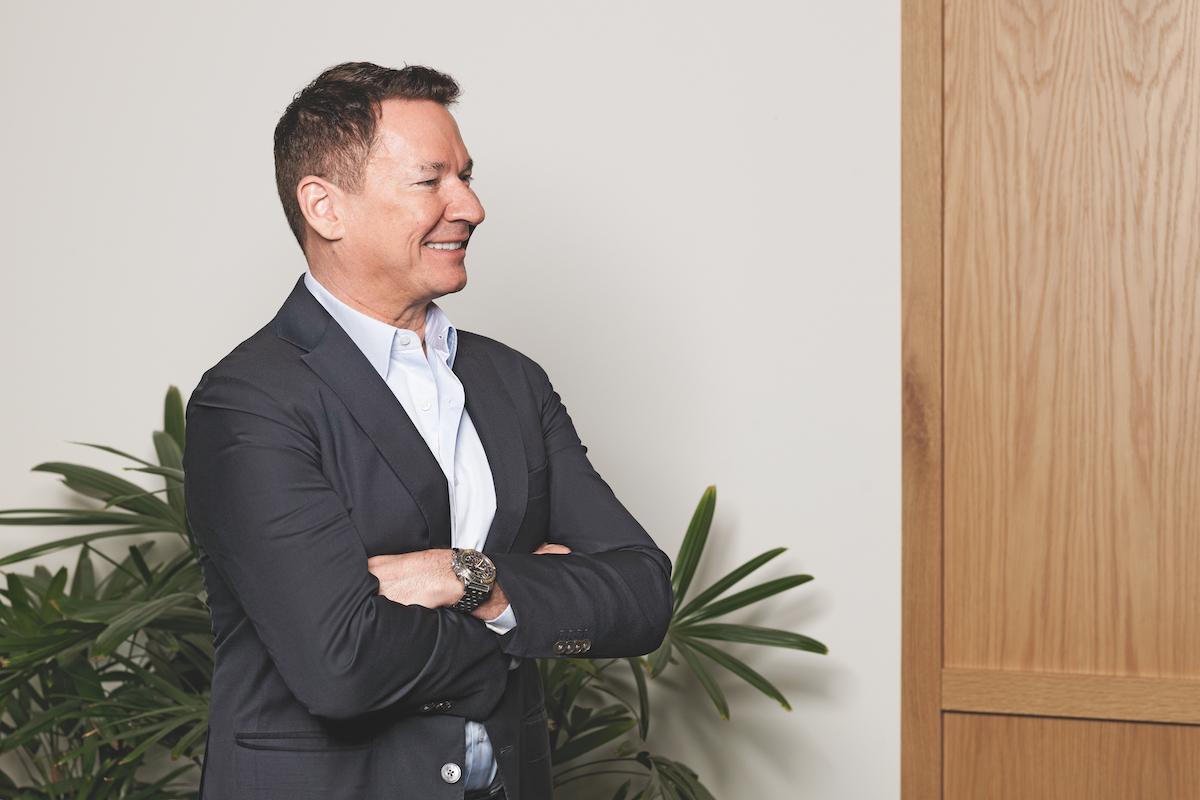
After a year, he was one of two offered a full-time position and a 10-year career path leading to a role as a Kmart store manager. “But that frightened me,” Quentin admits. “Being young and ambitious, I thought why wait 10 years to manage a Kmart store?”
Quentin answered an advertisement in the paper for an assistant store manager at discount chain Venture. Age and experience didn’t matter, it was all about energy and passion – qualities Quentin had in spades. Within a year he was store manager but with his focus on becoming a buyer, he packed up his life and drove across the border to Melbourne.
It wasn’t long before the 20-year-old was a trainee buyer with another discount chain, Dimmeys & Forges. “That was the best training ground,” he remembers.
“As a buyer you interviewed the supplier, bought the product, merchandised it on the shelf and did the catalogue and marketing work. On the day of the sale, I was on the microphone spruiking. You couldn’t imagine those sale days; it was like a Boxing Day sale every day. I would be literally standing on a big table of towels, selling them at half price and surrounded by people snaffling as many as they could carry. You’d be unpacking cartons and people would be ripping them out of the boxes. On the flip side, if something didn’t work, it was an immediate life experience. That was how you learned the trade.”
Within 12 months, Quentin was the manchester buyer and six months later he was assistant controller for the home area, overseeing five stores. But it was a phone call from a friend, a lobster and a flashy tie that led to his long career at Spotlight.
“This mate was in the industry trading towels and told me there was a role in manchester at Spotlight, so I cold-called and scored an interview with Morry. I knew I was up against far more experienced buyers with more impressive resumes, so it was up to me to prove myself. The interview went for three-and-a-half hours,” he laughs.
“We did role-playing on suppliers, but the thing that got Morry really interested was when we got into product. I could tell he was visibly annoyed that I was buying Tontine pillows cheaper than Spotlight. He was also obviously testing me for design because he asked whether I chose my nice floral tie. I said yes. However, it was actually my girlfriend at the time who pulled it out and said I should wear it.”
Having convinced one brother that he was right for the role, it was time to be interviewed by the next. As the afternoon interview with Ruben drifted into the evening, the pair moved onto dinner at one of Melbourne’s more popular Japanese restaurants. Enter the lobster.
“It was the first time I’d eaten raw fish,” he reflects. “But it was followed by lobster and a job offer from Ruben. While he acknowledged I didn’t have the experience, he thought I had a lot of potential, a testament to the type of leader that Ruben was. He was willing to give me the opportunity and throw his support behind me. I was also excited by the fact the role came with a car, to be honest.”
The following week, the first thing Quentin did was resign from his role at Dimmeys & Forges. Once on board at Spotlight, it didn’t take Quentin long to appreciate Morry’s and Ruben’s individual approaches to business.
Recognising that both were clearly very entrepreneurial, he describes Morry as focused on overseeing and providing guidance on systems, analytics, IT and negotiation skills, while Ruben, who passed away from cancer in 2009, was more flamboyant, and had an incredible eye for retail. Without question, Quentin attributes both Morry and Ruben as his most influential business mentors.
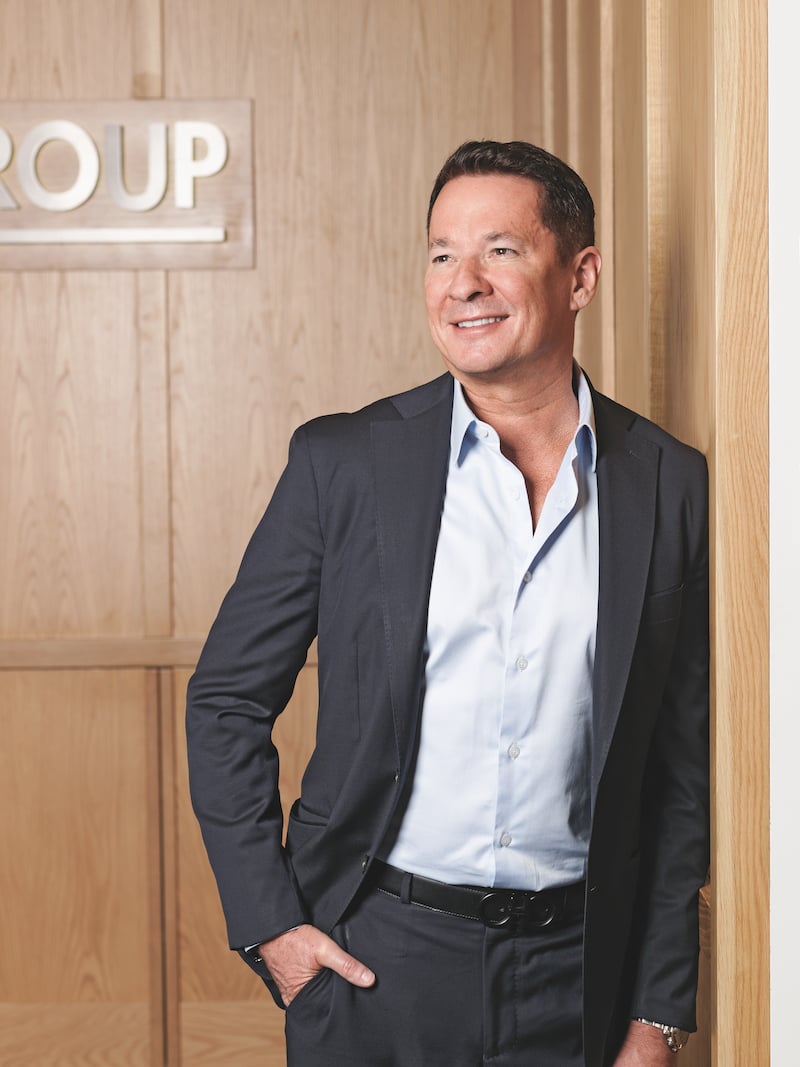
Every Friday for lunch, schedules permitting, he still meets with Morry who, while stepping back from the business, is the major shareholder.
Quentin says the conversations inevitably centre around business, with the agenda usually focused on his own internal issues or plans. Quentin appreciates that after all this time Morry is still his mentor.
“What I appreciate most is the collaboration and shared ideation with Morry,” says Quentin. “We work together to conceptualise and visualise, and he respects my opinions and challenges ideas. When I was young I would spend a considerable amount of time pushing my ideas. If we were aligned, I knew the idea would fly,” Quentin says.
In 2007, after 13 years with Spotlight, Quentin moved on from the company when an opportunity too good to refuse came from James Packer to head up the mogul’s Pretty Girl Fashion Group in Sydney. Quentin explains the offer came at the right time, and he jumped at the chance to work with another retail and business visionary.
It was also around the time when Spotlight was looking for a new CEO due to Ruben’s ill-health and Morry transitioning to retirement. A decision was made to hire someone externally.
While Quentin admits that resigning from Spotlight was a little like “going to your mum and saying you’re moving out of home”, he also understood that strong businesspeople don’t allow emotions to enter decision-making. He says one of the most important lessons he’s ever learned centres around having a constructive reaction when good people leave.
Not too long after – four years to be exact – Quentin was back with the brothers. “I was CEO of Spotlight for about two-and-a-half years when I was asked to head up Anaconda as well. My Anaconda involvement was just that Morry’s brother-in-law and a friend of his came to us 16 or 17 years ago, with this concept of an outdoor adventure store. I guess Morry and Ruben trusted my retail judgement at that point and sent me on a study tour to the US to flesh out what this concept would look like.
“I remember we spent about a week touring around all the outdoor adventure stores and sporting stores in the US, before locking ourselves in a hotel room in California. We were there for three days with about 200 sheets of butcher’s paper mapping out what the concept would look like.
“When we came home, we pitched it to Morry and Ruben – with me as a support act to the two young, ambitious go-getters. We launched the company and I had little more to do with it.
“But when I returned to Spotlight, the founders had been bought out and there’d been a rotation of leaders, so we brought Spotlight and Anaconda together as a shared service of ecommerce, marketing, IT, finance and logistics. We worked as one unit to gain extra efficiency and achieve best practice across both brands.”
Spotlight focuses on four key objectives, described by Quentin as the simplicity of retail. They are to maximise sales, maximise gross margin, optimise expenses and manage your stock, and are so ingrained throughout the company that Quentin believes any Spotlight or Anaconda employee should be able to rattle off all four.
“It’s what retailing is all about,” he says. “If there’s anything that a manager is doing that doesn’t deliver to one of those four, then it’s time to stop what you’re doing. To support our aggressive growth vision, we went out and got the best outdoor adventure retailers to join the team – we basically did whatever we needed to do to get them into the business. Since then, business has flourished and we’re opening eight to 10 stores a year. We built a great leadership team in Anaconda and, while I’m still supporting it from the board and a mentoring role, the company now has its own CEO.”
Stepping away from Anaconda has given Quentin the freedom to focus entirely on Spotlight, expanding the business into more overseas markets, looking for acquisitions and opening more stores. One initiative is the Spotlight Creative store, a smaller-format store focusing solely on the brand’s creative categories such as craft, sewing and party.
There will be over and above creative concepts in the destination stores, to excite and enable customers with demonstrations of sewing machines, craft tools, the latest fads in crafts and face painting for the children.
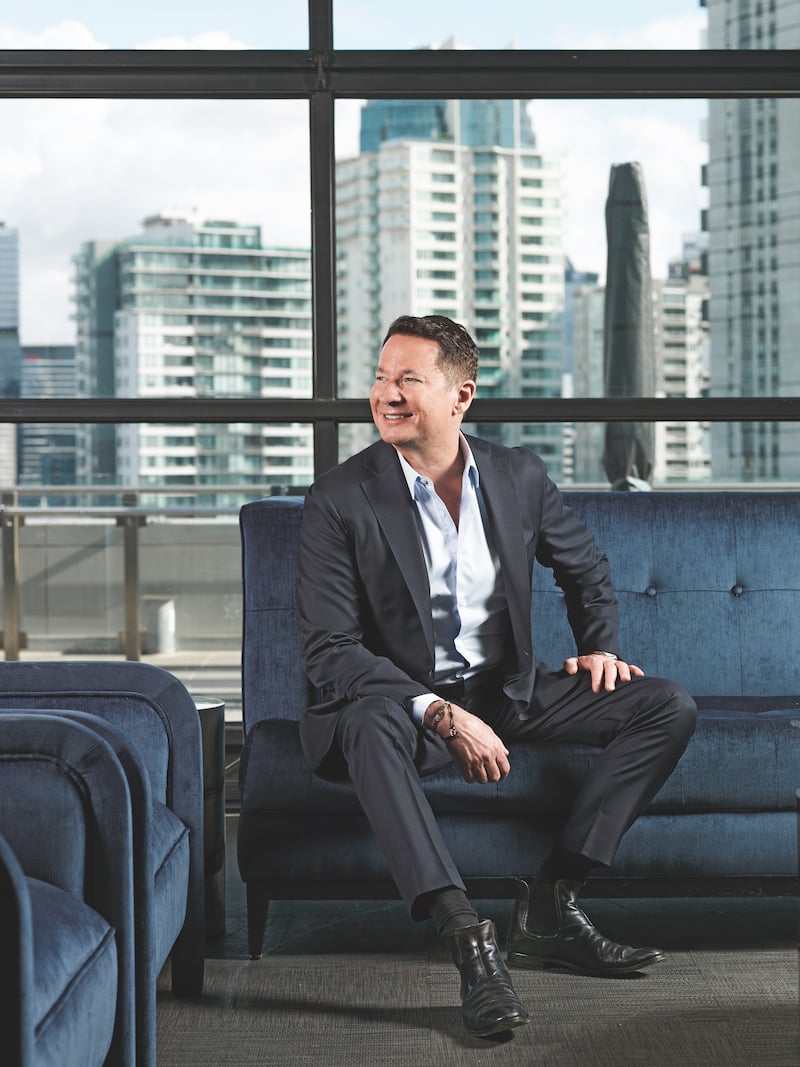
There are two Spotlight Creative stores operating in Melbourne and Brisbane, with a third in the planning stages. There are also plans to open more in Singapore and Malaysia.
“It dawned on me a few years ago that we should offer classes and DIY workshops in our strongest heritage categories. Not only would they reach new customers, they are new product propositions unique to malls, where it’s difficult finding enough space for a traditional Spotlight store.
“Obviously, the shopping mall is where people drift and window shop, so this will expose our brand to new customers who don’t associate themselves with the brand. The creative stores will let them fall in love with who we are, get them into the stores and go ‘wow’. We thought we’d launch the Spotlight Creative concept in Australia first, and then expand it to international markets.”
Quentin confirms that Spotlight competes well in global markets because of its phenomenal buying power. Spotlight is able to leverage its international footprint by utilising the local suppliers and manufacturers in each international market.
“That’s the funny thing,” Quentin reflects. “I remember thinking when we first went to Singapore and got off the plane into 32-degree heat, ‘Who is going to buy fleecy fabric and doonas?’. But realistically, it’s much the same for our consumers in northern Australia, who think that when temperatures plummet to 28 degrees, it’s cold.
“We probably ship close to 95% of the same products into our international markets. What we have learned over the years is how to localise, to cater to different shopping habits or communication methods. We also had to alter our range to incorporate things like different sizing for windows and beds. One thing we didn’t think of when going into Malaysia and selling to the Muslim community is the fact that we couldn’t supply any products containing pork. Many of our artistry brushes contain pig hair and some of our confectionaries have traces of pork. It was only a minor adjustment for us, but one we had to make.”
Walk into any Spotlight store and you’ll see a healthy mix of age groups serving on the floor, from schoolkids working their first part-time job to seniors semi-retired. Quentin says many of the staff grew up ‘playing with the product’, with the younger employees familiar with the store after having visited it with their mums and the older staff often hobby enthusiasts.
The value partners bring
Having worked in retail for nearly 30 years, Quentin Gracanin understands the value of reliable suppliers, particularly with the extraordinary variety of products offered at Spotlight. Many of them are family-run companies enjoying a business partnership with Spotlight for decades.
Caprice, founded in 1959 as the first manufacturer to produce continuous sheer curtain fabric, is one of Spotlight’s closest and largest partnerships. “The founder used to come to our family market 46 years ago carrying a suitcase full of lace curtains to sell. We have also grown and learned the business together with Birch, our haberdashery supplier, and Mittal, who provides us with home textiles such as linen, curtains, rugs and cushions,” Quentin says.
Spotlight relies on Project Outlook for its window furnishings and its multi-solution approach to numerous product ranges from blinds and curtains to fabric, rod sets and accessories, while SSS provides sewing and craft supplies. Its global clients include Disney, Warner Bros and Marvel, as well as Diamond Dotz, the world’s fastest growing craft and one of Spotlight’s fastest growing categories.
Unique giftware and homeware products from kitchen accessories to table linens have been supplied by Ladelle for 35 years, while every party need imaginable, themed or not, is supplied by the world’s largest global party company, Amscan. Think candles, plates, balloons – even themed hair accessories.
The company’s largest consumer group is women. However, due to the resurgence of hobbies such as crafting and sewing, Spotlight is seeing an uptick of people across the board tapping into their inner creative. “We’ve got enthusiasts in here buying fabric every week,” Quentin explains.
“They love it. While new people are coming into the store all the time, we have regulars who have been coming for years, who came with their parents as kids, and now bring along their own children and grandchildren.
“I do think kids get dragged around Spotlight until they’re about 15, when they think ‘I’m too cool for Spotlight’ and drift away from the store, although there’s a fair chance they’ll visit to buy the party products they know are there. Then as soon as they move into their first home, they remember Spotlight and return to decorate or pick up their hobbies again. That’s when they become our lifetime customers. It’s a life cycle.”
Unleashing the inner stylist is an obvious appeal when at Spotlight. Browsing every department – from craft to haberdashery and party to homewares – can’t help but trigger the creative mood to craft, sew or decorate. Quentin believes the element of individuality and personalisation is becoming stronger than ever, a culture particularly sought after by younger generations.
“And we can provide everything that’s needed at Spotlight,” he says. “You can add unique touches everywhere, styling your home or your party. There’s no end to the potential.
“That’s key to the success of our bricks-and-mortar stores,” Quentin adds. “We are a very tactile store; people like to come in to look and touch. Yes, we’ve evolved our digital presence to omni-channel, and our marketing model has changed to cater to ecommerce logistics, and we communicate and deliver differently to suit the needs of our customers. But retail is a constant evolution; you need to be prepared for change and adapt. We are well aware of external market influences and keep our finger on the pulse; we have an insurgent owner’s mindset. We know that it is our actions that control our future.”
“We are a very tactile store; people like to come in to look and touch.”
Quentin doesn’t hesitate when asked if he has a favourite department. He goes straight back to his roots in manchester, the sector where his buying career began and one he freely admits constantly captures his attention. A generous assumption that he probably changes the design of his doona cover every year, is met with a derisive laugh.
“Every year? Every couple of weeks probably,” he laughs. “Manchester is in my blood. I know the categories so well and it’s where I can have some fun. So, to anyone who runs the division, guess what, you’re going to get a CEO with a very strong opinion.”
There’s no doubt Quentin’s personal evolution was largely forged by his mentors Morry and Ruben, and also via the long-term and close working relationship that he shares with Zac Fried, Ruben’s son.
Did you know?
The reason why Spotlight Co-Founders and brothers Ruben Fried and Morry Fraid have different spellings of their surnames dates back to their school days. As the children of an immigrant family arriving in Australia from Israel in 1956, and with six years separating them, they were schooled at different times. Morry’s teachers misspelled his name and the version stuck.
Quentin and Zac began working in the business at around the same time, and Zac is now Deputy Executive Chairman and Head of Property for the group, as well as the President of the Large Format Retail Association. Sharing a strong passion for the business, together they have delivered a string of achievements.
However, when it comes to Quentin describing his own leadership style, his gift for the gab stalls. In short, while he’s happy to talk about business, his wonderful colleagues or indeed his customers, he’s not so forthcoming when it comes to talking about himself.
“Culturally, I’ve grown up with leaders who have an open-door policy and that’s how I lead the team at Spotlight and encourage our leaders to lead their teams. So it’s open door at any level in the organisation, be it a junior buyer through to senior management. I take individual teams out for lunch to connect, from a buyer’s assistant to the senior leaders.
“Culturally, I’ve grown up with leaders who have an open-door policy.”
Ah, lunch. So, is it still lobster? “No,” he laughs. “It’s usually Chinese yum cha at a round table so it’s easier to talk to everyone. It’s all about talking to people and listening because I want to hear what’s happening. Definitely, there’s no question people would say I’ve got a strong opinion, and I do quite often make a direct and decisive call. But together we are a powerful team and the team’s views usually shape the best decision.”
Quentin won’t go as far to say he’s a workaholic but admits he never switches off. As the father of two teenage daughters, he says he’s engaged 24/7 with life, and honours his commitments to his children, fiancee Roze and business – no matter where he is and whatever the hour.
“Roze would probably say I’ve got a good balance. The only thing she’d mark me down on is when I apparently act like a CEO at home. Sometimes we’ll be in a conversation and she’ll say, ‘Don’t CEO me’. My mind runs at a different pace and I guess the way you interact with people is a little bit different. It’s a behavioural thing.”
Another ‘behavioural thing’ for Quentin is maintaining strong relationships with his suppliers, people with whom he’s enjoyed many years of relationships. While he has a more-than-competent leadership team, he admits he’s the first to pick up the phone if he spots an opportunity.
“I’ll just say ‘Give me something that’s going to rock our world’ in terms of a deal for our customers. Ruben used to say, ‘If it ain’t broke, break it’, meaning to grow, to change, to challenge. Don’t be safe, don’t go with the tide; swim against it.”
Proudly supported by:
